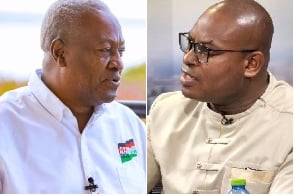Richard Ahiagbah, the Communications Director of the New Patriotic Party (NPP), has vehemently denounced the recent arrest of Ashanti Regional Chairman Bernard Antwi Boasiako, widely recognized as Chairman Wontumi, labeling it a politically motivated act of persecution orchestrated by the incumbent administration. Ahiagbah argues that this arrest, and others like it, forms part of a larger pattern of intimidation tactics employed by the ruling National Democratic Congress (NDC) to deflect public scrutiny from its unfulfilled promises and policy failures. He contends that the government, led by President John Dramani Mahama, is attempting to create a diversion from the pressing economic concerns affecting the lives of ordinary Ghanaians by targeting political opponents. This strategy, according to Ahiagbah, aims to shift the national conversation away from the NDC’s shortcomings and onto manufactured controversies.
Central to Ahiagbah’s critique is the government’s failure to deliver on its economic pledges, particularly those aimed at improving the livelihoods of Ghanaians. He highlights the stark contrast between the promises made by President Mahama during his campaign and the current economic realities faced by citizens. Ahiagbah specifically points to the unfulfilled promise of a 24-hour economy, a flagship initiative that was touted as a key driver of economic growth and job creation. He argues that instead of delivering on this commitment, the government is engaging in what he terms “24-hour intimidation” of political rivals. This, according to Ahiagbah, demonstrates a misplaced focus on political maneuvering rather than addressing the genuine concerns of the populace.
Ahiagbah’s accusations further underscore the growing political tensions between the NPP and the NDC as the country gears up for the 2024 general elections. The arrest of Chairman Wontumi, a prominent figure within the NPP, has exacerbated these tensions and fueled accusations of political persecution. Ahiagbah’s strong condemnation of the arrest serves as a clear indication of the NPP’s perception that the NDC is using its power to stifle dissent and silence opposition voices. He has called upon the government to prioritize accountability and transparency, not as a means of concealing its own failures, but as a genuine commitment to addressing the needs of the Ghanaian people.
In his public statement, Ahiagbah directly challenged President Mahama, demanding answers regarding the government’s economic performance and job creation efforts. He emphasized the pressing need for the government to address the “bread-and-butter” issues that directly impact the lives of ordinary Ghanaians. By focusing on the lack of tangible economic progress, Ahiagbah aims to expose what he sees as the government’s attempts to divert attention from its failures through politically motivated actions. He argues that the government’s preoccupation with targeting political opponents is a clear indication of its inability to effectively manage the nation’s economy and deliver on its promises.
Ahiagbah’s remarks highlight a broader concern over the potential erosion of democratic principles and the increasing polarization of the political landscape in Ghana. The accusation of politically motivated arrests raises questions about the impartiality of law enforcement agencies and the government’s commitment to upholding the rule of law. The NPP’s assertion that the NDC is using intimidation tactics to silence opposition voices further underscores the importance of safeguarding freedom of speech and ensuring a level playing field for all political actors. These concerns are particularly crucial in the lead-up to the 2024 elections, as a fair and transparent electoral process is essential for maintaining democratic stability.
The escalating political tensions between the NPP and the NDC, exemplified by the arrest of Chairman Wontumi and Ahiagbah’s subsequent condemnation, signal a potentially contentious political climate in the run-up to the 2024 elections. The accusations of political persecution and diversionary tactics underscore the need for a renewed focus on dialogue, accountability, and adherence to democratic principles. As the two main political forces in Ghana, the NPP and the NDC bear a significant responsibility to ensure that the political discourse remains civil and focused on addressing the critical issues facing the nation. The ability of both parties to engage in constructive dialogue and prioritize the needs of the Ghanaian people will be crucial for maintaining political stability and fostering a conducive environment for free and fair elections.


